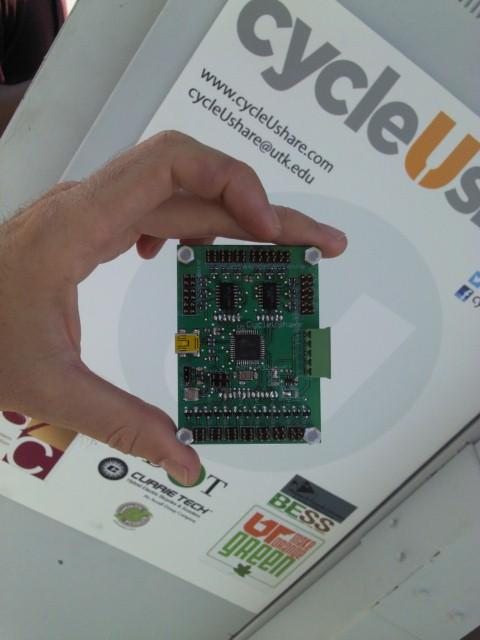 We just published another article on simulation of e-bike sharing station, focusing on simulating demand parameters and optimizing station design (e.g., number of bikes, batteries etc). Our TRR paper is still in press too and can be downloaded here.
We just published another article on simulation of e-bike sharing station, focusing on simulating demand parameters and optimizing station design (e.g., number of bikes, batteries etc). Our TRR paper is still in press too and can be downloaded here. Electric bike sharing: simulation of user demand and system availability
Shuguang Ji, Christopher R. Cherry, Lee D. Han,
David A. Jordan
Suggested Citation:
Ji, S., Cherry, C.R., Han, L.D., Jordan, D.A. (2013) Electric bike sharing: simulation of user demand and system availability. Journal of Cleaner Production. DOI:10.1016/j.jclepro.2013.09.024 (In Press).
Ji, S., Cherry, C.R., Han, L.D., Jordan, D.A. (2013) Electric bike sharing: simulation of user demand and system availability. Journal of Cleaner Production. DOI:10.1016/j.jclepro.2013.09.024 (In Press).
You can download the preprint here: https://www.dropbox.com/s/z96yxta9ug12a3j/EbikeR_Final_Submit-Preprint.pdf
This paper describes the
operational concepts and system requirements of a fully automated electric bike (e-bike) sharing system demonstrated through a
pilot project at the University of Tennessee, Knoxville (UTK) campus (deployed
in September 2011). This project is part of a movement to develop a sustainable
transportation system, and is one of the green initiatives on UTK campus. E-bikes
are more energy efficient and produce fewer greenhouse gas (GHG) emissions per person
compared to other transport modes such as car, bus, and motorcycle. Without empirical demand information for an e-bike sharing
system, we simulated the operations of such a system to gain insights during
the design process before field deployment.
The simulation exercise focused on three critical demand parameters – distributions
of trip rates, trip lengths, and trip durations – and coupled them with supply
parameters – number of e-bikes, number of swappable batteries, and battery
recharging profiles. The primary purpose of these simulations is to evaluate the
efficiency of an off-board battery recharging system, where the depleted battery
is removed from an e-bike upon its return and inserted into one of the charging
slots at the kiosk. We tested various scenarios with different number of
batteries always maintaining an initial condition with the battery to e-bike
ratio greater or equal to 1.0 to ensure battery availability. We applied
empirical battery recharging rates and system operations rules to determine the
number of e-bikes and batteries available under different potential demand situations, with a focus on optimizing
the number of batteries to meet user demands. By adjusting input parameters, numerous scenarios were simulated
for sensitivity analysis. Based on the results of the simulation, this paper
presents a cost constrained e-bike sharing system design that can maintain a
high level of system reliability (e-bike and battery availability) through
optimal battery charging and distribution management. We found that high demand
scenarios require multiple swappable batteries per e-bike to reasonably meet the
maximum demand. Trip duration has the most influence on e-bike and battery
availability, followed by trip rate, and then trip length.


